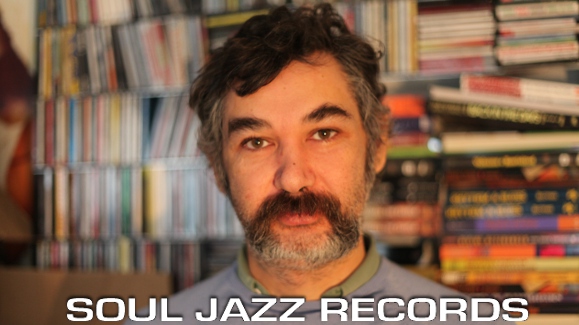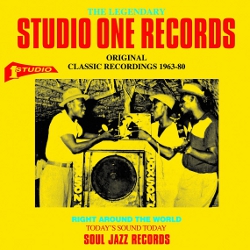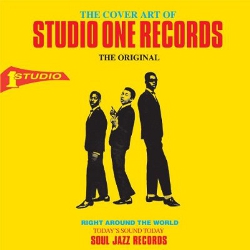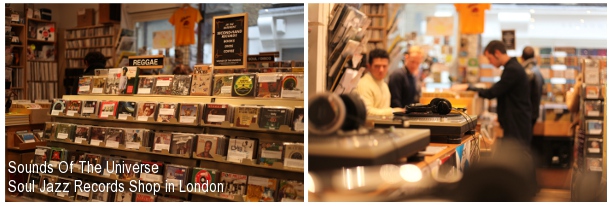Articles about reggae music, reviews, interviews, reports and more...
Interview: Stuart Baker, founder of Soul Jazz Records
- Home
- Articles
- Interviews
- Interview: Stuart Baker, founder of Soul Jazz Records

Interview: Stuart Baker, founder of Soul Jazz Records
"We built up the courage to contact Clement Dodd and told him how much we admired Studio One"
Sampler

Soul Jazz and Studio One is back
Soul Jazz Records is an acclaimed label that has evolved into a diverse company that offers both records, DVD’s and books. One of the label’s highlights is the relationship with Studio One Records. United Reggae has talked to Soul Jazz’ founder Stuart Baker about Studio One and the future.
Soul Jazz Records is an independent label that started its journey more than 20 years ago and has since issued music in a broad range of genres, including reggae, house, hip-hop, punk, jazz, funk, bossa nova and soul. Music with strong historical and social background.
Apart from releasing records, Soul Jazz has also ventured into publishing books and DVD’s as well as branched out to Sounds of the Universe, a label, releasing more specific single artists, and the name of the shop in London
“We are indeed an independent label and as such see ourselves as quite removed from the mainstream music industry,” explains Stuart Baker, founder of the label, and continues:
“Five years ago we decided to develop our publishing offer within music books and films, in order to move in a different direction from other labels. This seems to have worked. In the future I would like to develop a digital model for what we do, that incorporates music and books and film in some way.”
Passion is the key
Soul Jazz is known not only for great music, but also for great packaging and design. The releases usually include booklets rich of photos and texts on the history of the project.
“Although we have changed styles many times, we always have a passion behind our releases and wish to communicate this to people - hopefully this is our reputation,” explains Stuart.
Built up courage
One of the critical factors behind the success among the reggae audience is the relationship with Studio One Records that started about twelve years ago, and the great releases that have sprung from that connection.
“We built up the courage to contact Clement Dodd and told him how much we admired Studio One and asked if he would be interested in working with us,” reveals Stuart, and explains why Clement Dodd chose to work with Soul Jazz:
“He chose to take a chance and trust us to work with. I think it was because we were always polite and when we first introduced ourselves we said that we were a record company who released soul, jazz, reggae etc as opposed to just reggae. We sent material from our catalogue which I think is how he wanted to be presented – alongside jazz music for instance rather than solely reggae.”
Clement Dodd was one of the instrumental forces behind reggae music, and Stuart explains what is so special about Studio One.
“Well, it is a much used phrase, but it is the foundation label of all reggae music. It was at the centre of a musical world and leading the way.”
Back on track with Studio One
A few years back Soul Jazz, to many people’s disappointment, stopped reissuing Studio One material. Stuart explains that it had to do with family issues.
“Studio One is a family business. Our relationship began with Clement Dodd. When he sadly died in 2004, we continued our relationship with Studio One via his daughter Carol and his wife Norma Dodd, who also sadly passed away in 2010,” says Stuart, and continues:
“These events obviously meant that for a while Studio One's concerns were elsewhere, however we are now both looking to the future.”
Sleeves strength of the catalogue
 The relationship between Soul Jazz and Studio One is now happily back on track, and the first scheduled releases are a compilation of Studio One tracks titled 'The Legendary Studio One Records' and a book on the cover art of Studio One.
The relationship between Soul Jazz and Studio One is now happily back on track, and the first scheduled releases are a compilation of Studio One tracks titled 'The Legendary Studio One Records' and a book on the cover art of Studio One.
'The Cover Art of Studio One' follows other great books from Soul Jazz, including Beth Lesser’s 'Dancehall – The Rise of Jamaican Dancehall Culture' and Gilles Peterson’s and Stuart Baker’s 'Freedom, Rhythm and Sound – Revolutionary Jazz Original Cover Art 1965-1983'. Stuart explains the story behind the new book.
 “Well, anyone who collects Studio One knows that the sleeves are very much a part of the strength of the catalogue. We began publishing books about five years ago, such as Beth Lesser's Dancehall and cover art books about jazz and also Brazilian music, so a Studio One book seemed a very natural thing to do,” explains Stuart and adds:
“Well, anyone who collects Studio One knows that the sleeves are very much a part of the strength of the catalogue. We began publishing books about five years ago, such as Beth Lesser's Dancehall and cover art books about jazz and also Brazilian music, so a Studio One book seemed a very natural thing to do,” explains Stuart and adds:
“We had a lot of the covers but called upon the collector’s community for those really rare bits. I'd like to thank Rob Chapman and Brentford in particular for their verging-on-the-obsessive knowledge of Studio One.”
“Styles match the music”
Studio One’s cover sleeves artwork changed during the years of operation, and you can see a great difference in, let’s say, early ska releases and the dub albums issued in the late 70’s.
“I think the styles match the music. Ska releases such as The Skatalites are charged with a dynamism and energy. Rock steady releases such as The Cables and Alton Ellis are cool and restrained. Dub albums are minimal and sparse and the dancehall era has some of the best in my view,” explains Stuart, and adds:
“Even though Studio One used a number of designers the covers always feel like Studio One.”
The 200 page book contains hundreds of both classic and rare sleeves. Stuart says he loves them all, but mentions two that stick out.
“I love the Juks Corporation cover where the characters move along the dancehall and the girl vanishes in the different editions,” he says, and continues:
“I love the fact that The Wailing Wailers had an earlier sleeve with the group in different positions.”
Studio One favorites
When it comes to particular album releases it seems easier for Stuart to mention favorites, at least with regards to albums from Soul Jazz.
“On Soul Jazz I would say Studio One Rockers, which was our first, The Keyboard King by Jackie Mittoo, which was one of our most successful and our four hour film Studio One Story, which was a big project,” he says, and continues with original Studio One albums:
“Original Studio One is an almost impossible question to answer. In fact it is impossible! This second I would say I love Michigan and Smiley for the culmination of musicianship, good time feeling, the re-using of rhythms and the intellectual fun of this and the timelessness.”

Planning new Studio One releases
There are a number of Studio One releases planned, but Stuart is keen not to reveal any details.
“Our Studio One releases focus on compilations, which leaves Studio One itself free to promote its own catalogue at the same time,” he says.
Still, Stuart says that he’d like to reissue classic albums from the likes of The Skatalites and Horace Andy.
“But really, we are very happy in the approach of compiling the catalogue in hopefully interesting, fun and different ways.”
Read more about this topic
Comments actually desactivated due to too much spams
Browse by categories
Recommended Articles
Latest articles
Recently addedView all
© 2007-2026 United Reggae. All Rights Reserved. Reproduction in whole or in part is prohibited. Read about copyright
Terms of use | About us | Contact us | Authors | Newsletter | A-Z














